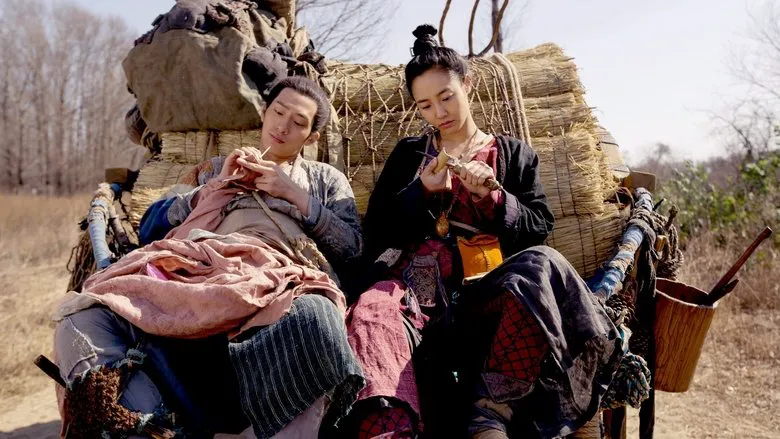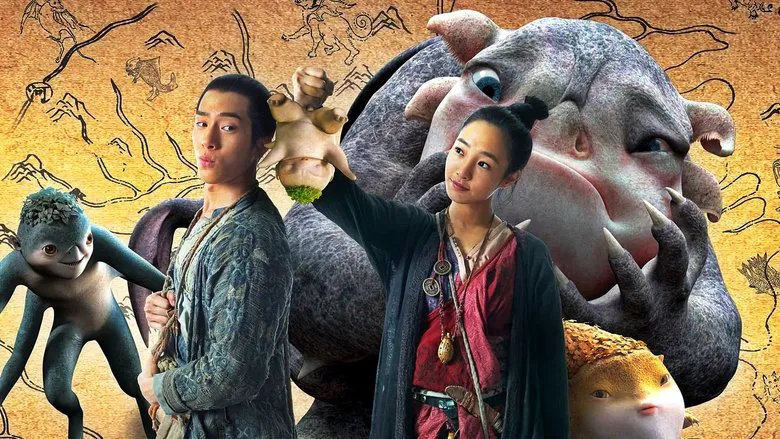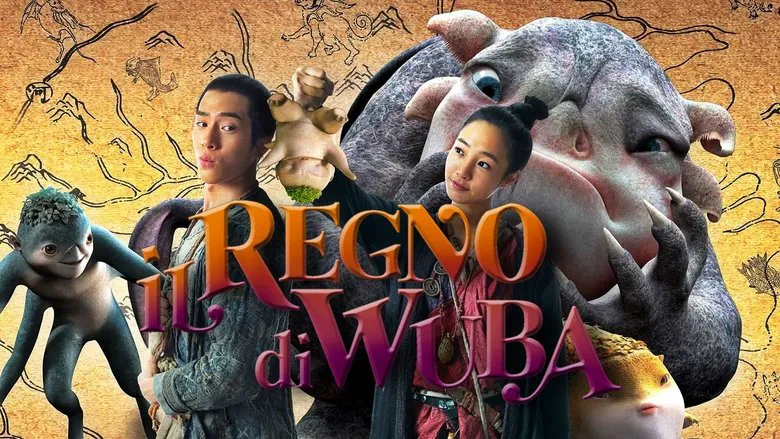A delightfully charming, kind-hearted, and visually vibrant family-friendly fairy tale with a distinct “Chinese” flavor, which some might even find hilariously funny.
Not far from the human world lies a realm of monsters, recently thrown into turmoil. A cruel tyrant has usurped the rightful throne, forcing the pregnant queen to flee. She stumbles into our world, encountering a simple-minded village boy to whom she entrusts her unborn child. The young man is bewildered by this tiny creature when it’s born. However, a chance acquaintance of his, who makes a living hunting monsters, suspects that the monster prince could be sold for a hefty profit.

Behind the Scenes Change
The film was initially shot with a different actor, Kai Ko from Taiwan, in the lead role. However, during post-production, Ko became embroiled in a marijuana scandal, leading director Raman Hui to replace him with Jing Boran. Consequently, a significant portion of the film had to be reshot.
The Rise of Chinese Cinema
It’s no secret that the Chinese film industry is experiencing unprecedented growth. In just a few years, it’s projected to match the total box office revenue of the American film industry. However, it already possesses a significant advantage: it doesn’t need anyone else. While major Hollywood hits are designed for international distribution, Chinese blockbusters are primarily created for domestic audiences and a few culturally aligned countries. This limits budgets (the $100 million price tag that Hollywood hits start at is still unattainable for the Chinese), but it allows for the creation of uniquely local and exotic projects like “Monster Hunt.”

Box Office Success
“Monster Hunt” grossed $383 million (USD) in China alone, becoming the highest-grossing film in Chinese box office history.
To confirm that this is “not a film for everyone,” simply watch the trailer. Beyond the various “special effects” monsters and wire-fu action sequences, which Russian audiences are somewhat accustomed to, you’ll encounter some genuinely WTF moments. For instance, the main character becomes pregnant after meeting the monster queen and gives birth to an egg containing a baby monster (don’t ask how). In the film itself, sensitive European viewers may be taken aback by the unusual level of violence. A comical kitchen scene, where a boisterous chef played by Yao Chen prepares exotic dishes from monsters, culminates in the cooking of an amusingly grumbling monster. And there’s also singing and dancing!

Yao Chen’s Impact
Yao Chen, who delivers a hilarious performance as the “monster kitchen” chef, was featured on the cover of the annual Pirelli calendar this year for her work as a goodwill ambassador. She has 70 million followers on Chinese social media.
Why You Should Watch It
Despite the cultural differences, “Monster Hunt” is worth giving a chance because it feels refreshingly different compared to the monotonous output of Hollywood. It’s a purely Chinese comedy with a “signature” brand of absurd humor reminiscent of the work of Stephen Chow and Jeff Lau in the 90s, but made with a completely new level of technical sophistication. This isn’t just about the abundance of special effects (there are many monsters on screen, but their designs are quite stylized), but also a certain Hollywood-esque solidity, thanks to director Raman Hui. Hui is originally from China but worked exclusively in the West, where he was involved in animation and co-directed “Shrek the Third.”
“Monster Hunt” also offers newcomers a chance to see two generations of top Chinese actors. The two monsters in human form are played by the undeniably brilliant comedians Eric Tsang and Sandra Ng, while the main roles are played by rising stars Jing Boran and Bai Baihe. The latter has every chance of becoming a major star of her time – few actresses today can be so subtle, awkward, funny, touching, and natural all at once.